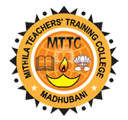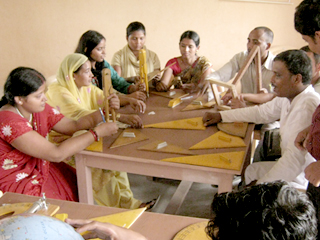
Mithila Teachers' Training College
AT +P.O.: Basuara, Distt.: Madhubani - 847212 (Bihar)
Permanant Recognised by: ERC, NCTE Bhubaneswar (Govt. of India), Permanent Affiliated to : L. N. Mithila University, Darbhanga
D.EI. Ed. Affiliated to Bihar School Examination Board, Patna
(Accreditation with "B" Grade by NAAC)
Introduction
In the Pre-independence era "Education" was the state subject. Since, the India became free and constitution of its own was framed the issue of "Education" was the subject in priority. By subsequent amendments in the constitution, protection to receive education was conferred not only to specified community, society, religion, class and caste rather to all citizens of India equally. By transfer of contents of Entry II of list II to III as entry 25 has not denuded power of the state legislation to enact law on the subject ‘Education’ but has also conferred power on parliament to enact law on the subject ‘Education’. As such, the subject Education was transferred to concurrent list from the state list. The one billion population of India consists of six main ethics groups and fifty two major tribes, six major religion and 6400 castes and sub-castes, eighteen major languages and 1600 minor languages and dialects. India is divided in different linguistic states. The states have been carved out on the basis of the language of the majority of persons of that region. The vital issue arose before the framer of the constitution of India to provide education to all citizens and ensure the protection of educational right to all citizens without drawing a discrimination between rich & poor, religion and languages race, caste and creed notwithstanding the various Articles of constitution vis-a-vis Art 41 of constitution, "right to education amongst others, is obligated to the secured by the state by making effective provision therefore. Fundamental duties recognized by Art. 51-A include amongst others: Art 51 A (h) to develop scientific temper, humanism and the spirit of inquiry and reform and Art 51-A (J) to strive towards excellence in all spheres of individual and collective activity, so that the nation constantly rises to higher level of endeavour and achievement. None can be achieved or ensured except by means of education. It is well accepted by the thinkers, philosophers and academicians that justice, Liberty, Equality and Fraternity including social economic and political justice, the golden goal set-out in the preamble to the constitution arc to be achieved, the Indian polity has to be educated and educated with excellence. Education is a national wealth which must be distributed equally & widely as far as possible in the interest of creating all egalitarian society to enable the country to rise high and face global competition. 'Tireless striving stretching its arms towards perfection" (to borrow the expression from Rabindra Nath Tagore) would not be successful unless strengthened by education. The farmer of the constitution strained over art 19 (i) G and "6", Art. 26 and 29 (1) and (2), Art 30 and 30 (i) to harmonise their inter-relationship in the interest of social & secular status of the law all though the Art 30 was provided to religious and linguistic minority exclusively to promote their language, culture and heritage and establish the educational institution of their choice. Art 30 (1) read with Art 29 (2) serves the purpose of both minority and' the non-minority community. As such the right of education and establishment educational institution referred under the Art. 30 (i) though it comprehends absolute right conferred to minority is not away of being harmonized by the Art 29 (2) and other related Articles of the constitution but not affects the autonomy of the minority in the institutional management and affairs. This is the glory of the constitution of India which leads the citizens to the fastest with the democratic and secular process. Our forefather, the framer of the constitution was aware of the importance of education to all. P. Ramanath Aiyer, has defined education in very wide terms:- Education is the bringing up the process of developing and training the power and capabilities of human beings, in its broadest sense the word comprehends not merely the instruction received at school or college but the whole course of training moral, intellectual and physical is not limited to the ordinary instruction of the child in the pursuits of literature. It also comprehends a proper attention to the moral and religious sentiment of the child. And it is sometimes used as synonymous with learning. "Alivin Toffler (1980) has advanced the idea that power at the down of civilization resided in the "Muscle" power then got associated with money and in 20th century it shifted its focus to 'Mind". Thus to shift from physical power to wealth power to mind power is an evolution in the shifting foundations of economy. This shift supports the observation of “Francis Bacon" who said "Knowledge" Itself is power" stressing the same point and upholding the supremacy of mind power in his characteristic expression, Winston Churchill said, "the empires of the future shall be empires of the mind". Thus he corroborated Bacon and professed the emergence of the knowledge society". Let us not forget the message of "Swami Vivekananda" as under:- "We want that education by which character is formed, strength of mind is increased, the intellect is expended, and by which one can stand on one's own feet". The end of all education, all training should be man-making. The end and aim of training is to make the man grow. The training by which the current and expression of 'will' are brought under control and become fruitful is called education." Without shadow of doubt, the concept of education is accepted that education is continual growth of personality, steady development of character and qualitative improvement of life. A trained mind has the capacity to draw spiritual nourishment from every experience be it defeat or victory, sorrow orjoy, Education is training the mind and not suffering the brain. In short, "education” is national wealth, essential for the nation's progress and prosperity. The Government of India has formulated and set up central councils for the development of education in all fields of education which includes general, technical and professional education and training. "The Milli Foundation" which figures as an important "Trust" pertaining to the aims & objects of developing education in all level & work to remove the illiteracy in the society of all communities & classes of people, more in the minority community of the region has chosen to produce skilled and trained personnel to meet the crying need of every educational institution running up to secondary level (10+2) Keeping in view the trust of teachers' training college, the Board of trustees constituted a sound minority management of the teachers' training college comprising expertise of education fields & administration to cater to the B.Ed. course training in exercise of the right under constitution of India. The college is running with its academic session since 2009-2010 under permanent recognition of ERC, NCTE and affiliated to Lalit Narayan Mithila University, Darbhanga. The college is self financed institution based on no profit-no loss - cost based institution. It has highly qualified and experience faculty members. The library & laboratories are well equipped with recent modern books & Literature and equipments to raise its status as an exemplary in the state incomprising to other existing teachers’ training college and the college of eminence institution. The college is situated at very communicable road linked with Madhubani Railway Station and Bus Stand & is at the distance of 5 K.M. only. The peaceful and healthy surroundings are the charm of the college.
